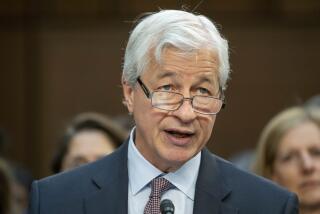WALL STREET AND THE ECONOMY : Greenspan Assessment Unusually Bullish : ‘Maximum Risk’ of Recession Is Over, Healthy Growth Is Ahead, He Says
- Share via
WASHINGTON — Federal Reserve Board Chairman Alan Greenspan, offering an unusually bullish outlook, said Wednesday that the economy has passed the point of “maximum risk” for a recession and is headed for healthy, moderate growth.
The “economic outlook, on balance, is encouraging,” Greenspan told the House Banking Committee, where he issued his twice-yearly report on monetary policy.
Despite Greenspan’s optimism, the stock market plunged sharply, before recovering somewhat late in the day. The Dow Jones industrial average fell 57.41 points to close at 4,628.87. Volume in all markets of 1.2 billion shares was the largest in history.
The emotion and uncertainty that usually envelop a hot stock market made it unclear whether Greenspan’s testimony accelerated the plunge in share prices or whether it was simply a case of an overheated market heading for an inevitable correction.
Greenspan was far more bullish than he was only a month ago, when he had warned in a speech that the nation could be headed for a modest recession. But he told the committee at Wednesday’s hearing that “more recent evidence suggests that we may have passed the point of maximum risk.”
This kind of comment represents a veritable outpouring of optimism from Greenspan, a man who is invariably cautious--and sometimes obfuscatory--in his public remarks to Congress.
Current “financial conditions should be supportive of spending, and businesses and consumers are largely optimistic about the future,” he said.
“The success of our previous policy tightenings in damping prospective inflation pressures sets the stage for our recent modest policy easing,” Greenspan said, referring to the Fed’s decision early this month to cut short-term interest rates.
The central bank felt its actions were justified “because the risks of inflation apparently have receded,” he said.
Business analysts welcomed the comments.
“If Greenspan was positive on the economy, he has every reason to be,” said Barry Rogstad, president of the American Business Conference, an organization of fast-growing enterprises.
The Fed’s effort to slow the economy without pushing it into recession “seems to be successful,” said Frank McCormick, vice president and senior economist at Bank of America.
However, future Fed action on interest rates is “very much up in the air,” depending on monthly employment and retail sales reports, McCormick said.
The analysts, who agreed on the general success of the Fed, offered sharply conflicting explanations of whether Greenspan’s comments should be blamed for driving down the stock market.
Rogstad said the market is driven by future earnings expectations and that discouraging news from the high-tech sector triggered the plunge Wednesday.
David Jones, an economist with Aubrey G. Lanston & Co., said: “It’s not a Greenspan stock market. It’s a stock market that was overdue for a correction.”
But McCormick said bond prices fell because investors were disappointed that Greenspan did not hint at future interest rate cuts. And the drop in bonds, he said, “could have contributed to the fall in stock prices.”
Greenspan’s testimony, accompanied by a formal Fed report to Congress, predicted lower inflation and somewhat higher unemployment for next year, as the central bank pursues a policy of enforcing price stability.
The twice-yearly forecasts include a consensus judgment on inflation and unemployment, an approach he calls the “central tendency of the expectations” of the Fed governors and the regional Fed bank presidents.
They expect the final inflation figure for this year to range between 3.125% and 3.375%, with prices moderating next year, when inflation will range between 2.875% and 3.25%.
The Fed raised its estimate of unemployment, which was expected to be 5.5% at year’s end. Instead, it is likely to range between 5.8% and 6.1%, Greenspan said. (The jobless rate was 5.6% in June for the nation and 7.6% for California.)
He noted that he had become notably more optimistic since his previous appearance before the committee. The “inflation picture is less worrisome than when I testified six months ago, just after our last policy tightening,” he said.
More to Read
Sign up for Essential California
The most important California stories and recommendations in your inbox every morning.
You may occasionally receive promotional content from the Los Angeles Times.













